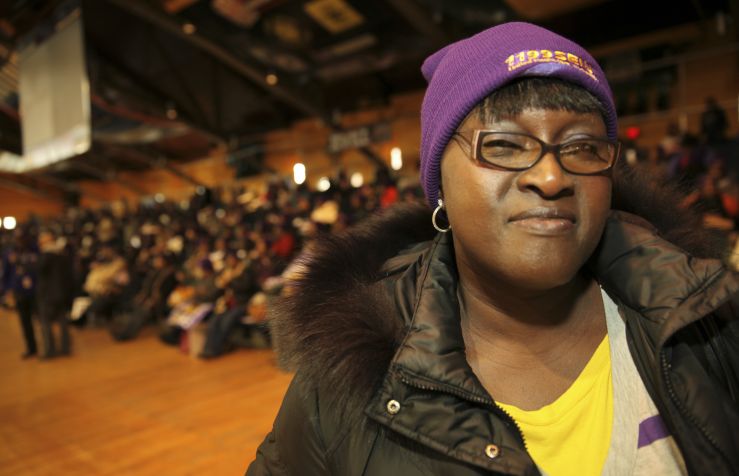New York’s Long-Term-Care Givers Win New Protections in State Budget
April 2, 2014
Just days before the April 1 New York State budget deadline, 1199SEIU members sent a powerful message to the Governor and state legislators that all healthcare workers deserve good jobs with fair wages and decent benefits. Five days after more than 5,000 caregivers rallied at the state’s capital in Albany, homecare workers were able to sigh with relief with the passage of the state budget that ensured managed care companies will fully fund wage and benefit increases won in the 2011 Wage Parity Law.
Certified Home Health Agency and Long Term Home Healthcare Program rates were increased in the budget to pay for the homecare worker wage and benefit increases required under that law.
“Now we can move forward,” said Paulette Abrams, a homecare worker employed by Social Concerns, Inc. “We fought long and hard for decent wages and benefits. We were not going to go back.”
Nursing home services will also be reimbursed under a new long-term managed care policy. Although 1199SEIU’s proposal for a prevailing wage in nursing homes was not included in this budget, new language guarantees that nursing homes will receive at least their existing Medicaid rates from managed care companies. This will protect resources for caregivers’ wages and benefits.
Despite federal cuts to education, including a $406 million cut to Head Start, the program for pre-kindergarten children, 1199SEIU members successfully helped secure $1.5 billion over five years, or about $340 million a year, for free full-day classes for 4-year-olds. Universal pre-kindergarten is a cornerstone of NYC Mayor Bill De Blasio’s education program.
The state budget package did not include permission for New York City to increase taxes on high earners. It did include tax cuts proposed by Governor Cuomo, including elimination of the dedicated bank tax and property tax and renter rebates.
Other healthcare budget highlights:
• $1.2 billion over five years for capital projects at certain healthcare facilities. Priorities for funding include participants in the Delivery System Reform Incentive Payment program (DSRIP) and projects which
enhance primary care or benefit Medicaid and uninsured populations.
• New York was given authority to develop a Basic Health Plan under the Affordable Care Act, to provide low-cost insurance for those whose income is up to 200 percent of the poverty level. Whether or not the State will use the authority is still being decided.
• An increase in Vital Access Provider funding to $194 million, which is used to help distressed institutions, such as Interfaith Hospital in Brooklyn.
• It eliminates the two percent cut to Medicaid rates in place since 2011.
• The Safe Patient Handling proposal was approved, requiring hospitals, nursing homes and other
residential facilities to form committees that include a majority of direct care workers to develop plans and strategies to reduce worker injuries and increase patient safety. A statewide committee will be formed, including 1199SEIU representation, to advise healthcare facilities.
• A new exemption to the Nurse Practice Act will allow nurses to delegate tasks to aides in homes for the developmentally disabled. It did not adopt the proposal for “advanced aides” to undertake those tasks in other settings.
The budget did not include the Dream Act to provide state scholarship dollars to undocumented students. Dream Act supporters will continue to fight for this important bill throughout the legislative session this spring.


